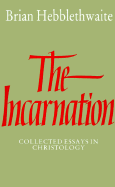Book contents
- Frontmatter
- Contents
- Preface
- 1 Incarnation – the essence of Christianity?
- 2 Perichoresis – reflections on the doctrine of the Trinity
- 3 Jesus, God incarnate
- 4 The moral and religious value of the Incarnation
- 5 Further remarks on the ‘Myth’ debate
- 6 The propriety of the doctrine of the Incarnation as a way of interpreting Christ
- 7 The Church and Christology
- 8 Christ today and tomorrow
- 9 The doctrine of the Incarnation in the thought of Austin Farrer
- 10 Contemporary unitarianism
- 11 ‘True’ and ‘false’ in Christology
- 12 Further reflections and responses
- Notes
- Index
6 - The propriety of the doctrine of the Incarnation as a way of interpreting Christ
Published online by Cambridge University Press: 04 April 2011
- Frontmatter
- Contents
- Preface
- 1 Incarnation – the essence of Christianity?
- 2 Perichoresis – reflections on the doctrine of the Trinity
- 3 Jesus, God incarnate
- 4 The moral and religious value of the Incarnation
- 5 Further remarks on the ‘Myth’ debate
- 6 The propriety of the doctrine of the Incarnation as a way of interpreting Christ
- 7 The Church and Christology
- 8 Christ today and tomorrow
- 9 The doctrine of the Incarnation in the thought of Austin Farrer
- 10 Contemporary unitarianism
- 11 ‘True’ and ‘false’ in Christology
- 12 Further reflections and responses
- Notes
- Index
Summary
For the larger part of their history, the Christian Churches have taught the doctrines of the Incarnation and the Trinity as central and essential to their faith. Their creeds, Councils and confessions, whatever their differences and whatever range of different interpretations they have permitted, have agreed in affirming that the central figure of the Gospels is to be understood not only as the revealer of God, but as himself the content of that revelation, God the Son made man for our salvation, and that the doctrine of God implied by that revelation is to be expressed in trinitarian terms. These are still, to a very large extent, the characteristic and peculiar beliefs of Christianity, in its Eastern Orthodox, Roman Catholic and Protestant forms. Nevertheless, since the Enlightenment and the rise of modern critical approaches both to scripture and to tradition, the propriety of these doctrines has been questioned. This questioning has been overwhelmingly a Protestant phenomenon, though there have been and are some indications of similar questioning in Roman Catholic theology at the turn of the century and today. Disregarding external critics of Christianity, we can point within the Christian Churches themselves to rationalist versions of the faith in which the eternal truths of reason (metaphysical and moral) have been held to constitute the essence of Christianity, deistic versions, which have sought to eliminate the notions of special revelation and divine action in the world, idealist versions, in which the concept of incarnation has been held to symbolise some universal identity of God and man, liberal Protestant versions, which have singled out either the God-consciousness of Jesus or his teaching as the crucial element in Christianity, and modernist versions, in which the life of the Church itself has been embraced as experientially self-authenticating, irrespective of its origins.
Information
- Type
- Chapter
- Information
- The IncarnationCollected Essays in Christology, pp. 53 - 76Publisher: Cambridge University PressPrint publication year: 1987
